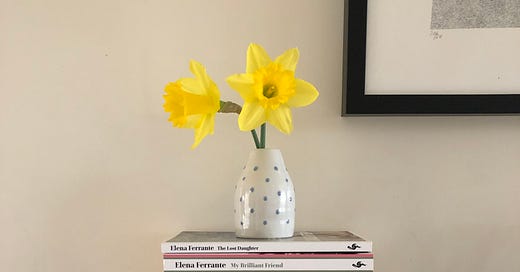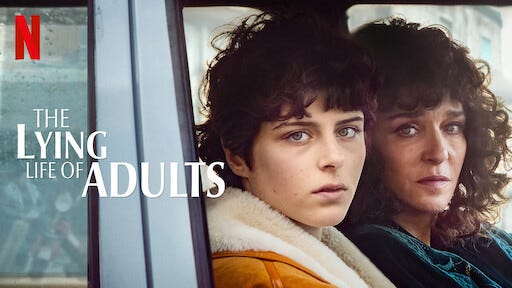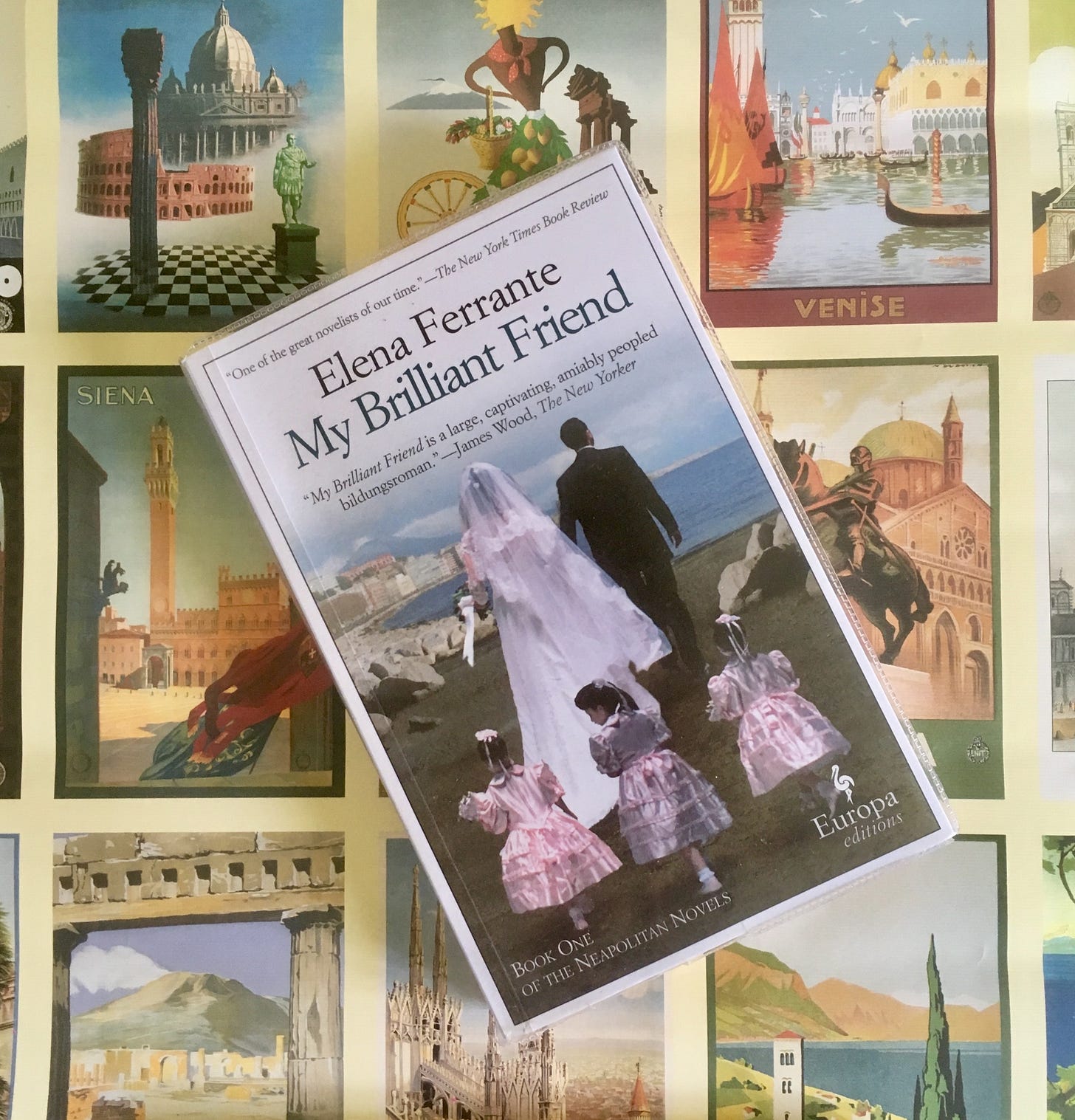I headed into 2023 slowly. That was always the plan. If anyone is going to take heed of nature’s cold and dark encouragement to hibernate, it’s this blanket-loving individual right here. And I carried this slow intention right through to my new year reading habits, progressing a small amount in an enormous book each day, rather than launching voraciously into something new.
As January moved on I started to feel a shift. Ready for more than the feeling of having ticked off a reading quota for the day. Ready to immerse headlong again. I picked up Elena Ferrante’s The Lying Life of Adults from the mobile library (reserved because I’d seen that Netflix was airing a new adaptation this year), knew this would be the answer and dived straight in.
You see me and Elena have previous. She ably shifted me out of a reading slump last year. An intense few weeks in the run-up to Easter and my reading (as is often the case) was the first thing to give. Away on a break with my daughter, I treated myself to The Lost Daughter—the one with the gorgeous film tie-in cover that had been doing the rounds on bookstagram that spring. We were only away for a few days, the book was finished before the holiday.
I am fascinated by what it is about Ferrante’s work that is so compelling. Particularly to me. It’s not that I’m looking for all my reading to be uplifting escapism, far from it. I revel in reading pretty downbeat and arguably depressing books at times, observing and admiring good writers grappling with human frailty and life’s complexities. BUT (and the caps are warranted because it’s a big but), the way I find connection to such books is, for want of a better word, heart. I relate, I care. If I stop caring, I usually stop reading.
And yet Ferrante’s books, while doubtless heated in terms of the sex and conflict bubbling ever near the surface, for me have a definite coldness. A barrier in place between us and the characters. I’m not sure she wants us to care about her characters, but just to see them, observe them. And perhaps from that place of discomfort staring the raw truth of these people in the face, be honest enough to reflect on the less pretty parts of ourselves.
I guess it’s all in the writing. The tight, emotionless observations hit harder and propel us forward. Zero reliance on heartstring-tugging or relatability. (This is perhaps even more interesting when you consider that we’re reading Ferrante in translation.) Maybe she wants us to see and think about things, more than to feel them.
Back to The Lying Life of Adults. It’s a coming-of-age story (or ‘bildungsroman’—a word I only finally learned the meaning of in relation to the Neapolitan Quartet), set in Naples. So far, so Ferrante. But where this latest book deviates from her strada well travelled, is in making the protagonist, Giovanna, from a family of well-off intellectuals from the fancy part of town. This then creates huge contrast with the lives lived by her aunt Vittoria (a fantastic character) and friends, who become integral to Giovanna’s transition into adulthood.
This is a novel full of duality. A city of two halves. Rich and poor. Ugliness and beauty. Truth and lies. Religion and intellectualism. And through it all a girl is becoming a woman and vacillating back and forth between these pairs of opposing forces, to find herself and her place in the world. This is a tough time for Giovanna to traverse, and all around her the adults are letting her down. They lie and they manipulate, and everything she thought she knew is challenged and falling apart.
As I write all that out I want to feel sorry for Giovanna. But I didn’t as I read it. The stark, removed style of writing leaves me observing her, not feeling for her. I adored the description of Giovanna in a Guardian review of the TV show as ‘a walking, talking shrug’.
Another key Ferrante trait and talent lies in scene-setting, placing us so deeply in the world of her characters that we can pretty much smell and taste it. The Lying Life of Adults is no exception, and this was fully embraced in the six-part Netflix TV adaptation, that I (of course) watched as soon as I’d closed the book. It’s beautifully filmed, vivid and colourful, bringing these two sides of 1990s Naples fully to life.
Actually (whisper it) I think the Netflix show is perhaps even better than the book. It sticks pretty faithfully to the source material. But just like with Sally Rooney’s Conversation with Friends, I found myself warming to the screen iterations of Ferrante’s characters much more.
The soundtrack to the TV adaptation is particularly brilliant. An interwoven element of the storytelling and the fabric of the characters’ lives. In each episode there’s a moment where the music forms an integral part of the scene. Singing and dancing at a church community concert, Giovanna working on her breakdancing moves, her mother lost and swaying in a drink-fuelled reverie. My favourite was at a dinner party with Giovanna’s family and their longstanding friends. Giovanna puts a tape into the ghettoblaster (oh hello ‘90s!) and the parents all sing along from the table, while the teenagers dance about. I’ve shared the song below—I loved it. It created such a moment.
And so to lean fully into my Ferrante fixation, I will be spending my summer in Naples. Bodily would be great, but definitely on the page. I’ve got the entire Neapolitan Quartet lined up ready. And of course, that will lead to another TV viewing extravaganza (My Brilliant Friend, available on NOW). Random side note, the image below is the first bookstagram-style photo I ever took. I wasn’t even on IG, but I had a sheet of the most perfect wrapping paper to use as a backdrop. My life as a bookstagrammer started with Ferrante.
The Lying Life of Adults is a definite recommendation from me, both book and TV show. The latter being so good I would forego my usual ‘read the book first’ caveat.
Please do comment below, I’d love to read your insights on the Ferrante phenomenon.
And for extra reading credit:
Elena Ferrante in conversation with (be still my fan girl heart) Elizabeth Strout: https://www.theguardian.com/books/2022/mar/05/i-felt-different-as-a-child-i-was-nearly-mute-elena-ferrante-in-conversation-with-elizabeth-strout
The Lost Daughter confronting the idealistic depiction of motherhood and maternal instinct: https://www.theguardian.com/film/2022/jan/05/the-lost-daughter-elena-ferrante-maggie-gyllenhaal-motherhood
Fascinating interview with Elena Ferrante’s translator Ann Goldstein: https://www.theguardian.com/books/2020/sep/12/ann-goldstein-i-try-to-make-it-really-clear-that-i-am-not-elena-ferrante (in which she mentions reading War and Peace, the enormous book referenced in my opening paragraph—oh the interconnectedness of everything!)
(Newsletter includes affiliate links to Bookshop.org, an excellent bookselling website supporting indie bookshops)









Never heard of this author and now I’m going to search for her. Thank you Claire!
I love Italy and used to go there for holidays a long time ago before children... ! There's something so gorgeously seductive about the Italian way of life. Rome is one of the best places in the world, it's such a beautiful and magical city, a church, fountain or statue round every corner. 🇮🇹 A few years ago I was very into the Michael Dibdin books which are all set in Italy, as well as the Inspector Moltalbano series on BBC. A total joy 🤩